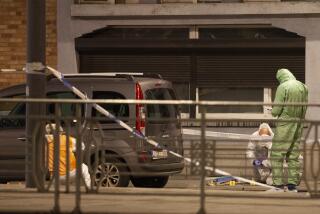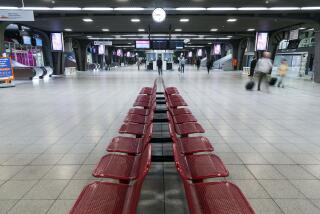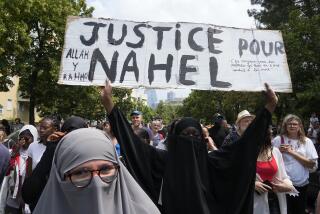Belgium’s identity crisis
- Share via
When you think of international ethnic hot spots, Belgium probably doesn’t jump to mind. Its 10 million inhabitants are relatively prosperous, and its two main ethnic groups, the Flemings and Walloons, with their different languages and cultures, aren’t blowing each other up with car bombs or hacking each other to bits with machetes. But that doesn’t mean Belgium is the model of inter-ethnic cooperation it’s cracked up to be.
Four years ago, outgoing Belgian Prime Minister Guy Verhofstadt called his nation “the laboratory of European unification.” In 1989, then-Prime Minister Wilfried Martens referred to Belgium as “the prototype of Europe.” The Federal Belgian State, he proclaimed, “is a prefiguration of a Europe of peoples, united in their organized diversity.” And, indeed, by virtue of a culture of political compromise and a mind-boggling, complex and constantly evolving government, for 177 years Belgium has managed not to split apart into its two major constituent pieces -- each with its own language, culture and traditions: the Dutch-speaking Flemings in the north and the French-speaking Walloons in the south.
Belgium, it seems, not only shares its capital, Brussels, with the European Union, it also serves as the latter’s model.
Three short years ago, a United Nations report on “cultural liberty” glibly offered multiethnic Belgium as proof that countries don’t have to “choose between national unity and cultural diversity.” But it may have spoken too soon. For more than three months now, an ethnic standoff among the political parties has left Belgium unable to form a new government, and a growing number of Belgians are beginning to wonder what -- other than soccer, frites and a king -- they all have in common.
In July, on Belgium’s national holiday, the prime minister-designate, Yves Leterme, made international news for avoiding the words to the national anthem -- he jokingly began singing the opening line of “The Marseillaise” instead -- and for not knowing what historical event (the inauguration of King Leopold I) the holiday commemorated. His defense? Polls show that only one in five Belgians know why they celebrate July 21.
Right-wing Europeans like to pretend that multiculturalism was born with the arrival of large numbers of Muslim immigrants in the last quarter of the 20th century, but Belgium was a multicultural state long before that. By the 1930s, the Belgian government gave up on the idea of a bilingual nation, in which a country promotes two languages equally, and instead established a regime of “dual monolingualism.” Since the 1970s, the once unitary government began to devolve into a federal system in which the constitution allocates power to the three economic regions -- Wallonia, Flanders and Brussels -- and three language communities: French, Dutch and German.
Because it was designed to protect the rights of the country’s three linguistic groups -- the Flemish make up roughly 60% of the population, French speakers 40% and Germans less than 1% -- the political system can best be described as an anti-majoritarian democracy in which power is balanced by proportional ethnic representation, executive power sharing and minority vetoes. Belgium has two separate and distinct political party systems and two electoral colleges, one French-speaking and the other Dutch. The German speakers get worked into the mix via complex formulas.
Though intended to facilitate compromise, the incorporation of linguistic differences into the political system does little to make diverse Belgians feel part of the nation at large. In fact, it only reinforces the sense that the Flemish and the Francophones (not to mention the small minority of German speakers) are entirely separate peoples.
And, not surprisingly, they act that way. Social interaction between the nation’s two largest groups is disappointingly low. So is intermarriage. People not only vote in separate elections, they watch separate television networks and read separate newspapers. Linguistic segregation in schools is also pretty thorough. In Wallonia, for example, only 17% speak passable Dutch in addition to French.
So what has kept this consummately postmodern -- or is it post-national -- country together thus far? The monarchy. But so far during this political crisis, King Albert II’s repeated calls for unity have gone unheeded.
Yet while some Belgians deplore what one Flemish philosopher disdainfully called Belgium’s “identity of non-identity,” others embrace it.
Nine years ago, a group of so-called Neo Belgicist intellectuals and artists published an open letter in which they affirmed their opposition to the existence of a single, solid national identity. Precisely because a national identity is nothing to be proud of, they argued, they are proud to be Belgians. In fact, they proclaimed Belgium to be the “antidote to nationalism.” And better yet, because it signifies so little, the Belgian state can easily be replaced by a new and broader “non-identity concept” of Europeanness.
But if model little Belgium collapses under the weight of ethnic tensions, what makes them think that the giant European Union will not suffer a similar fate?
More to Read
Sign up for Essential California
The most important California stories and recommendations in your inbox every morning.
You may occasionally receive promotional content from the Los Angeles Times.










